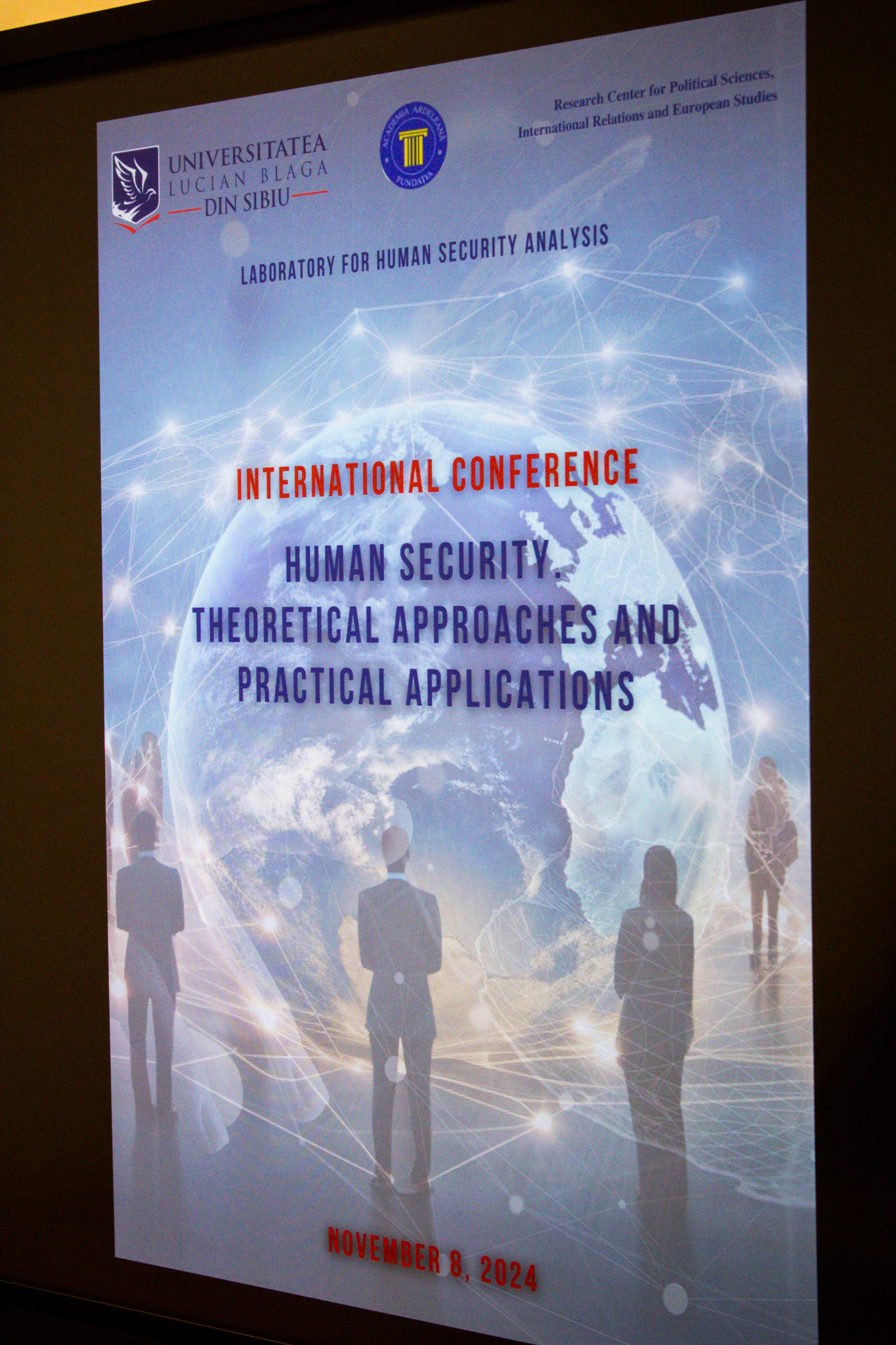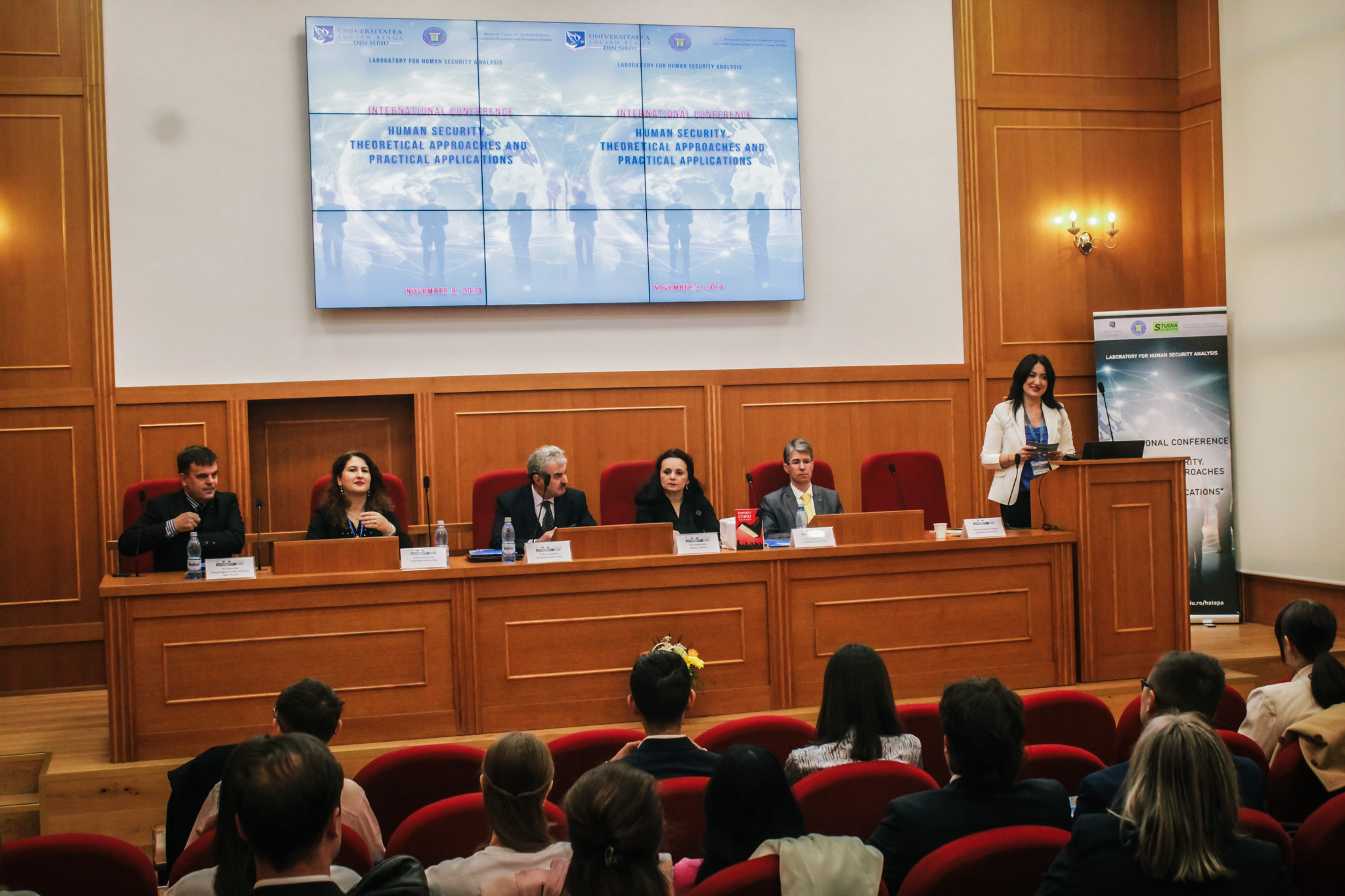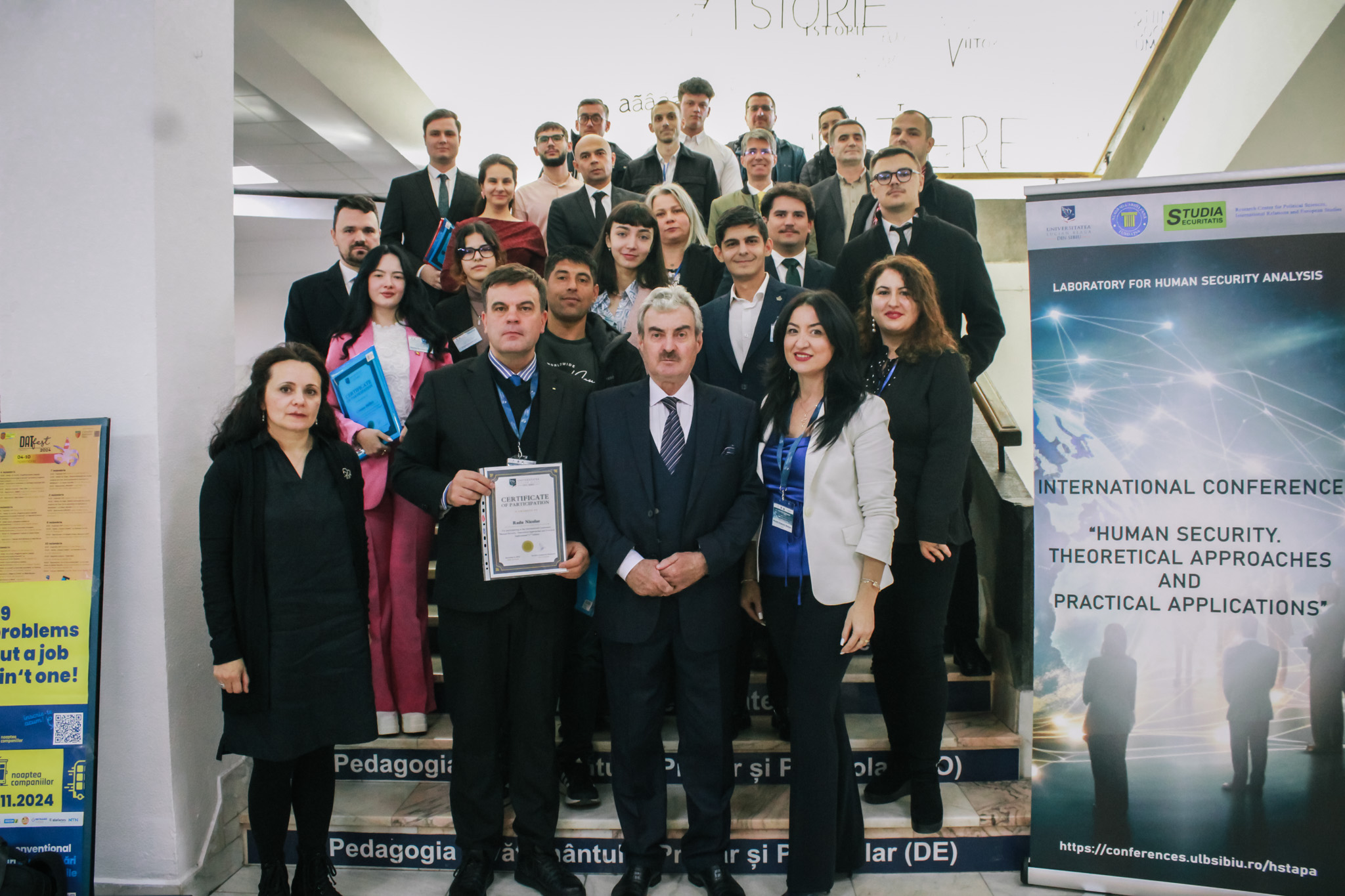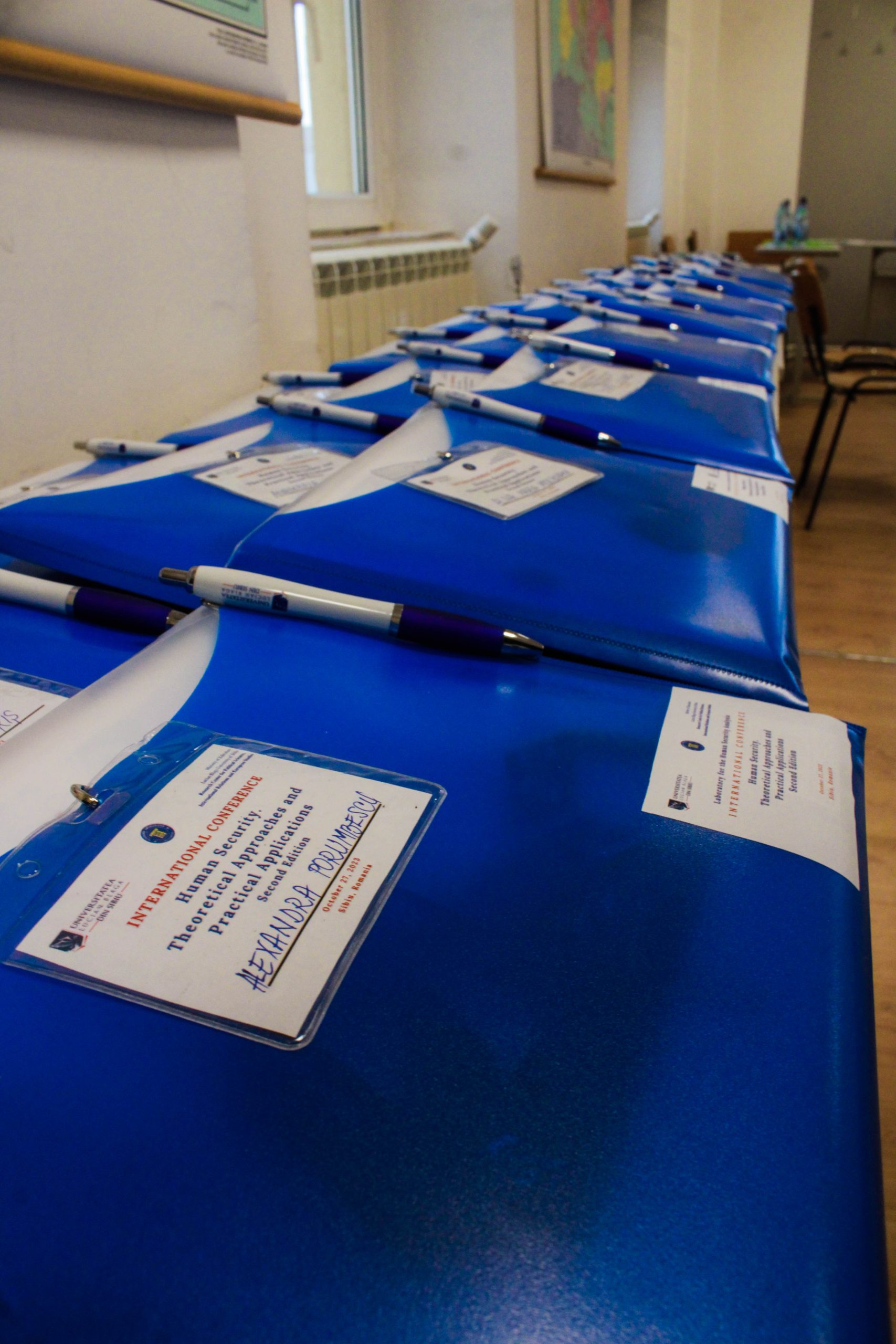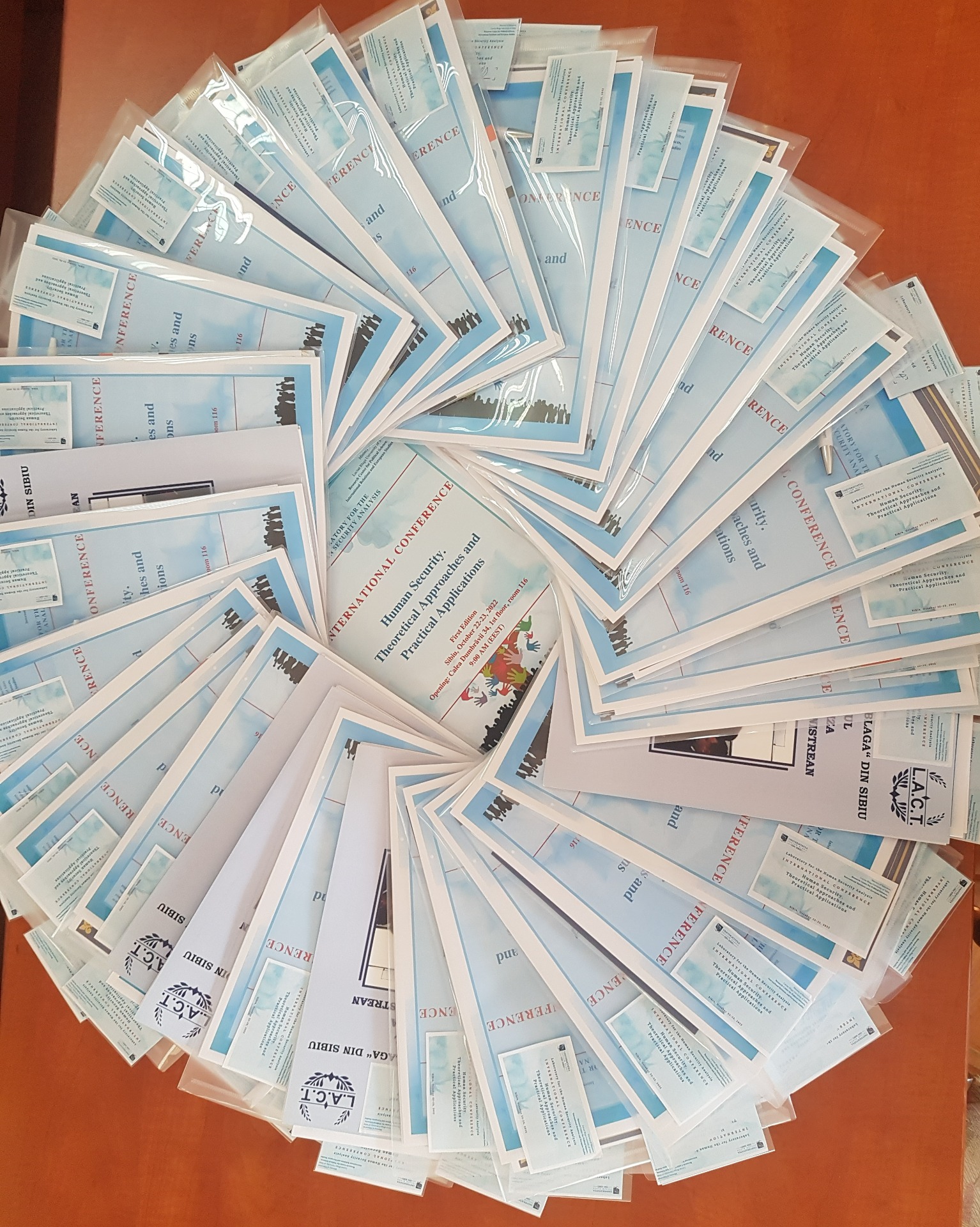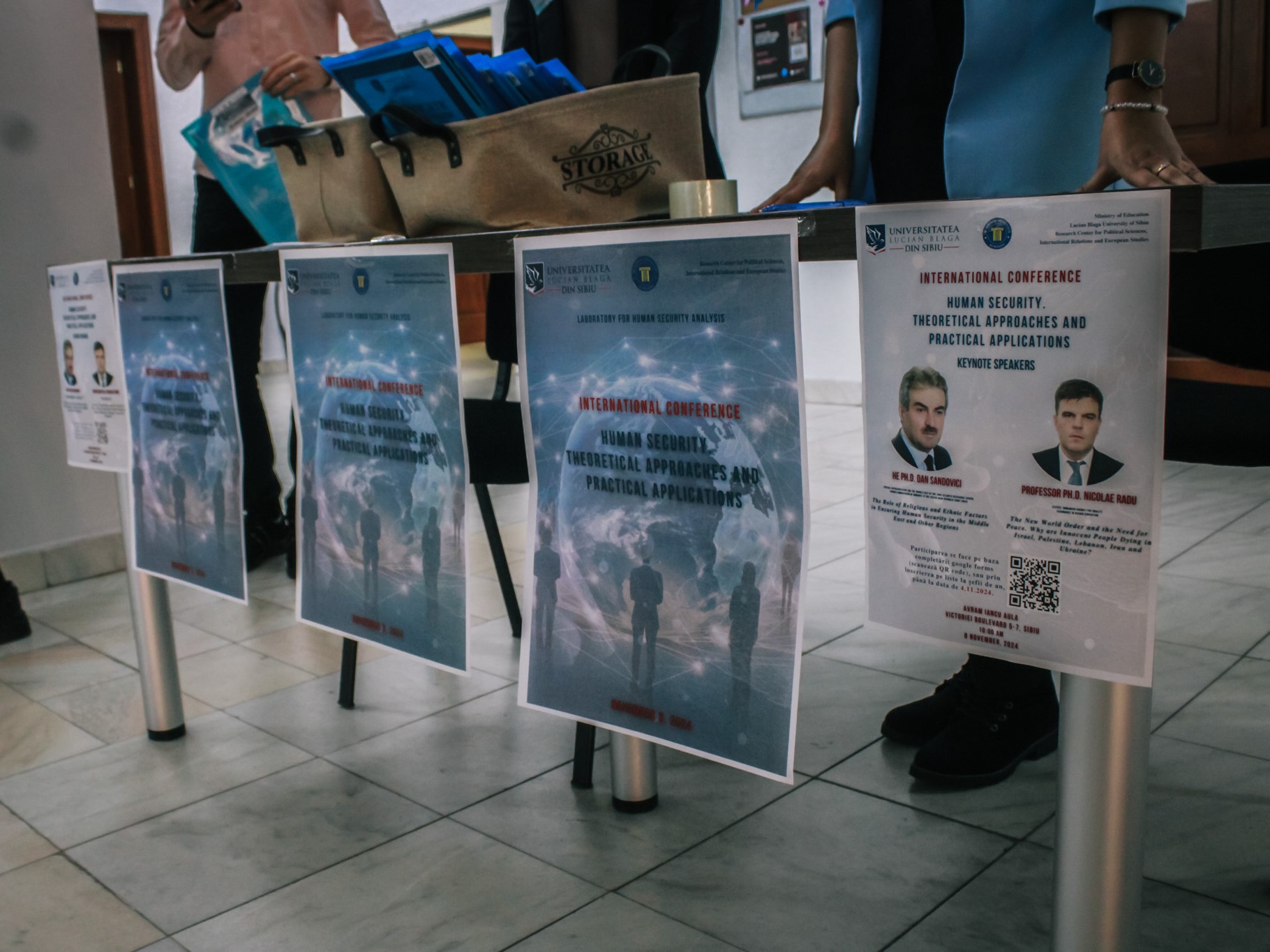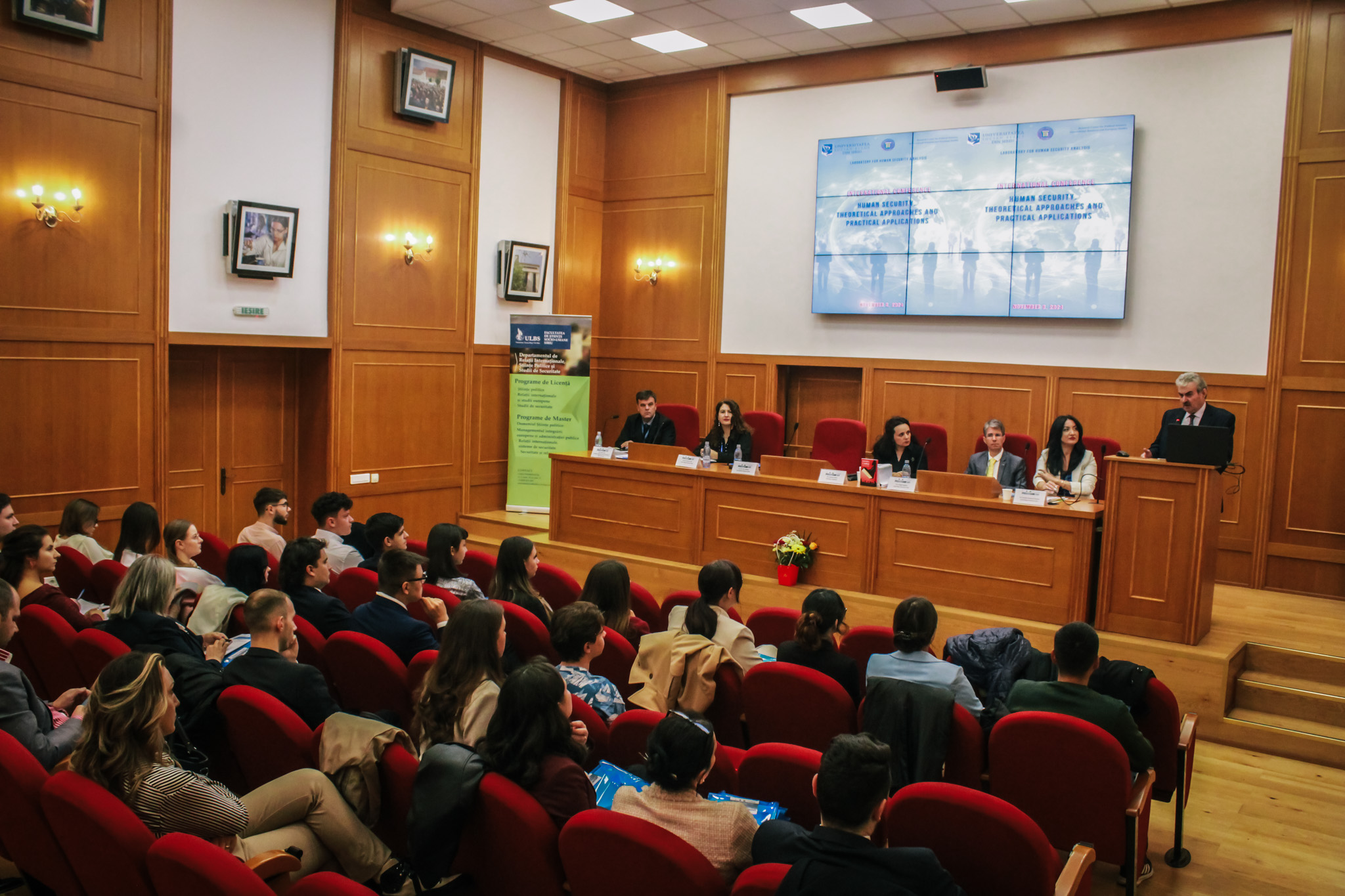
The International Conference “Human Security. Theoretical Approaches and Practical Applications” (HSTAPA) is an event that brings together leading academics, policymakers, practitioners, and civil society organizations to explore and advance the multifaceted concept of human security. This conference aims to foster a deeper understanding of theoretical frameworks while highlighting innovative practical solutions to contemporary security challenges, addressing the pressing issues facing humanity today.
The international conference HSTAPA is organized within the Research Center for Political Sciences, International Relations and European Studies, Laboratory for Human Security Analysis, affiliated with the Department of International Relations, Political Science and Security Studies, Faculty of Social Sciences and Humanities, Lucian Blaga University of Sibiu, and “Academia Ardeleană” Foundation of Lucian Blaga University of Sibiu. The Scientific Committee brings together renowned experts in the field of human security, from Philips University of Marburg, the Romanian Academy of Scientists, University of Strasbourg, University of Bordeaux, Florida Atlantic University, Sichuan University, Institute for Legal, Political and Sociological Research Chisinau, Free International University of Moldova, Lucian Blaga University of Sibiu, Institute for Political Studies Belgrade, National University of Public Service, Budapest.
The selected papers, according to the peer-review process, will be published in “Studia Securitatis” Journal (Studia Securitatis Journal ulbsibiu.ro).
Studia Securitatis Journal is a member of Crossref (https://www.crossref.org). We assign a DOI name for each article published in Studia Securitatis Journal. DOI prefix – 10.54989/stusec (https://www.doi.org/).
International Data Bases – ERIH+, CEEOL, EBSCO, DOAJ, J-GATE, INDEXCOPERNICUS, ULRICH`S PERIODICAL DIRECTORY, INFOBASE INDEX SOCIONET, RESEARCHBIB, MIAR, EUROPEAN XFEL PUBLICATIONDATABASE, GLOBAL IMPACT&QUALITY FACTOR)

Objectives
Examine Theoretical Frameworks. Delve into various theoretical perspectives on human security, including human rights, development, environmental sustainability, and conflict resolution.
Showcase Practical Applications. Present and discuss real-world case studies and best practices in addressing human security issues across different contexts and regions.
Promote Multidisciplinary Dialogue. Encourage collaboration and knowledge exchange among scholars, practitioners, and policymakers from diverse fields such as international relations, public health, sociology, environmental studies, and law.
Develop Policy Recommendations. Formulate actionable policy recommendations to enhance human security at local, national, and international levels.

Panels
The international conference HSTAPA offers four panels. The panel Civil Rights and Freedoms brings a theoretical insights by examining the relationship between human rights and human security. Also propose case studies addressing gender-based violence, protecting vulnerable populations, and promoting social justice and policy development for crafting international and national policies to safeguard human rights. The panel Migration and Refugee Management in the Human Security Landscape approaches the conceptual framework by analysing the impacts of migration and refugee flows on human security; proposes practical responses in terms of best practices in refugee protection, integration, and crisis management; also reiterate the importance of the global cooperation by enhancing international collaboration and legal frameworks to support migrants and refugees. The panel Energy Security. Challenges within the Current Context of International Relations presents the theoretical perspectives: exploring the nexus between energy security and human security; the sustainable solutions: innovations in renewable energy, access to clean energy, and resource management, also policy implications in developing strategies to ensure energy security while protecting the environment. The panel Artificial Intelligence – Driven Warfare. Impact on Cybersecurity and Communication Technologies in Hybris Conflicts proposes aspects regarding the theoretical foundations for understanding AI’s role in human security, ethical considerations, and potential risks, practical applications – case studies on AI in disaster response, healthcare, and conflict prevention and possible future directions related to balancing innovation with ethical guidelines and regulatory frameworks. More details about each panel – https://conferences.ulbsibiu.ro/hstapa/2023-2/panels-2024/
Previous Editions
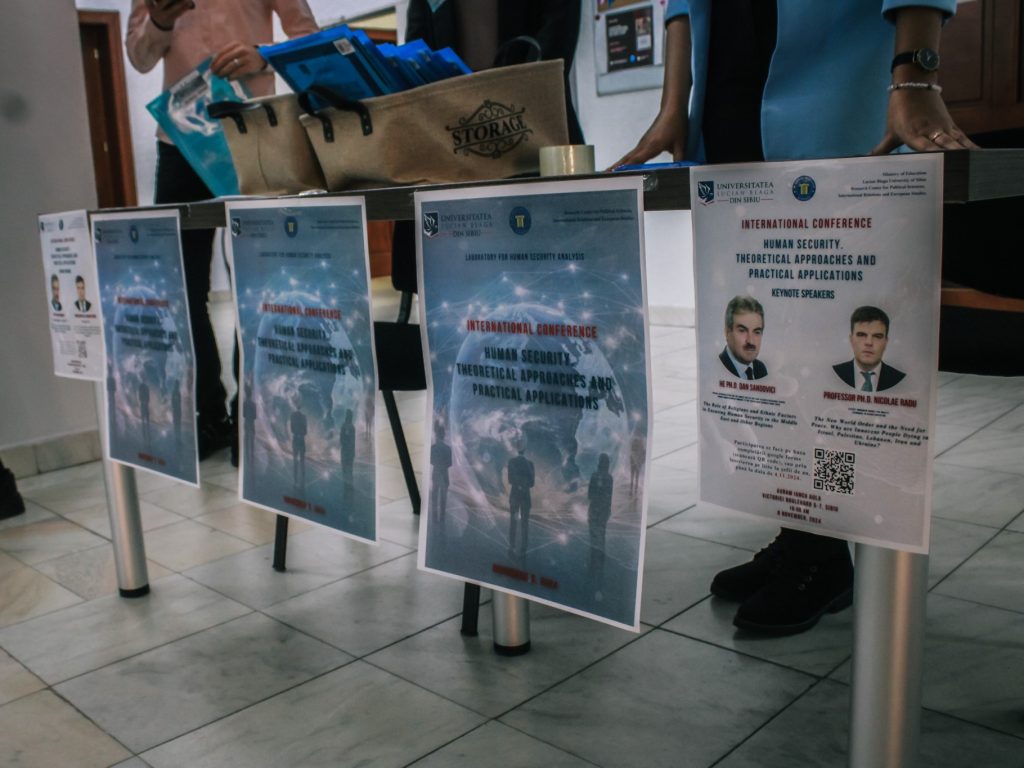
HSTAPA 2024 The third edition of the International Conference ”Human Security. Theoretical Approaches and Practical Applications” was organized by the Laboratory for the Human Security Analysis (Research Center for Political Sciences, International Relations, and European Studies) in collaboration with ”Studia Securitatis” Journal. The conference proposed four panels: ”Civil Rights and Freedoms”; ”Immigrants and Refugees in Eastern Europe”; “Energy Security. Challenges within the Current Context of International Relations”; “Artificial Intelligence. Driven Warfare. Impact on Cybersecurity and Communication Technologies in Hybrid Conflicts”.
The Conference Agenda lists 83 participants from 12 countries: Romania, Albania, Cyprus, Ghana, Greece, Hungary, Italy, Jordan, Nigeria, Poland, Republic of Moldova, Tunisia, representing 30 different universities, research centers and institutions: Adam Mickiewicz University of Poland; Alexandru Ioan Cuza University of Iași, Romania; Al-Qalam University, Katsina, Nigeria; Cardinal Stefan Wyszyński University in Warsaw, Poland; Carol I National Defence University, Bucharest, Romania; Euro-Atlantic Resilience Centre, Bucharest, Romania; Babeș-Bolyai University of Cluj Napoca, Romania; German Jordanian University, Amman, Jordan; Qalam University, Katsina, Nigeria; Lagos State University of Education, Lagos State, Nigeria; Mihai Viteazul National Academy of Intelligence, Bucharest, Romania; Ludovika University of Public Service, Budapest, Hungary; Moldova State University; National University of Public Service, Budapest, Hungary; Nicolae Bălcescu Land Forces Academy of Sibiu, Romania; Nicolaus Copernicus University in Toruń; Romanian Agency for Quality Assurance in Higher Education; Romanian Diplomatic Institute, Bucharest, Romania; Ștefan cel Mare Academy of Ministry of Internal Affairs of the Republic of Moldova; Takoradi Technical University, Ghana; University of Florence, University of Benin, Benin City, Nigeria; University of Bucharest, Romania; University of Carthage, Tunisia; University of Craiova, Romania; University of Crete-Rethymno, Greece; University of Nicosia, Cyprus; University of Oradea; University of Tirana, Albania.
Keynote speaker – H.E. Ph.D. Dan Sandovici, Special Representative for the Middle East of the Euro-Atlantic Resilience Centre, former Ambassador of Romania to the Syrian Arab Republic, The Role of Religious and Ethnic Factors in Ensuring Human Security in the Middle East and Other Regions. H.E. Ph.D. Dan Sandovici is the former ambassador of Romania to the Syrian Arab Republic (2007-2023), doctoral studies on Military Sciences and information, Carol I National University of Defence, Bucharest, Romania; knight of the National Order ”Legion of Honor” of France (2016); professor at Nicolae Bălcescu Land Forces Academy, Sibiu, Romania.
Keynote speaker – Professor Ph.D. Nicolae Radu, Expert, Romanian Agency for Quality Assurance in Higher Education, The New World Order and the Need for Peace. Why are Innocent People Dying in Israel, Palestine, Lebanon, Iran and Ukraine? Nicolae Radu held important positions in the national security system such as: head of the Center for Psychological Expertise within the SPP, Authorized Director at the Center for Psychosociology of the Ministry of Internal Affairs, counsellor secretary of state of the Ministry of Internal Affairs, CSAT counsellor, Presidential Administration and spokesperson of the Alexandru Ioan Cuza Police Academy. Since 2018, as an associate professor, he has taught courses in Ledership, Specialized Laboratory – Intelligence Services and Military Psychopathology at the University of Bucharest. Since 2015, Nicolae Radu has been a doctoral supervisor for Intelligence and National Security at the Carol I National Defense University. Currently, Nicolae Radu has operational concerns in the intelligence space, preventing and combating terrorism.
In the first part of the conference, we proposed two editorial signals: Ph.D. Dragoș Dragoman (Lucian Blaga University of Sibiu), Împotriva utopiei (Against Utopia), Alexandria Publishing House, Suceava, 2024, presented by Ph.D. Andreea Zamfira from the University of Bucharest, and Andreea Alexandra Dincă (former student – Security Studies Bachelor studies, Lucian Blaga University of Sibiu),Rolul analistului de intelligence în contextul dezvoltării inteligenței artificiale (Intelligence Analyst` Role in the Context of the Artificial intelligence` Development), PIM Publishng House, Iași, 2024, presented by Ph.D. Nicoleta Munteanu
The Scientific Committees brings together renowned experts in the field of human security, from Philips University of Marburg; the Romanian Academy of Scientists; University of Strasbourg, University of Bordeaux, Florida Atlantic University; Sichuan University; Institute for Legal, Political and Sociological Research Chisinau; Free International University of Moldova; Lucian Blaga University of Sibiu, Institute for Political Studies Belgrade, National University of Public Service, Budapest; Romanian Diplomatic Institute; Taras Sevecenko University of Kyiv; Ankara Yıldırım Beyazıt Üniversitesi; New Europe Center Kyiv; Sukhishvili University, Tbilisi; University of Information, Technology and Management of Rzesźov; University of Koblenz-Landau; University of Alaska, Anchorage; L.N. Gumilyov Eurasian National University, Astana; Florida Atlantic University.
The articles will be published in the Studia Securitatis Journal, the scientific publication of the Research Center for Political Sciences, International Relations and European Studies (indexed in ten international databases: ERIHPLUS, CEEOL, DOAJ, EBSCO, INDEX COPERNICUS, ULRICH’S PERIODICAL DIRECTORY, INFOBASE INDEX, RESEARCHBIB, MIAR, GLOBAL IMPACT & QUALITY FACTOR). Founded in 2007, Studia Securitatis Journalis a peer-reviewed academic journal dedicated to the field of security studies, primarily focused on topics related to national security, international relations, defense policies, and various dimensions of security studies. It serves as a platform for scholars, researchers, and professionals in the field to disseminate their findings, analyses, and theoretical discussions on a wide array of security-related topics. It is published biannually by the Lucian Blaga University of Sibiu, Faculty of Social Sciences and Humanities, under the Research Center in Political Science, International Relations and European Studies, and the Department of International Relations, Political Science and Security Studies. The journal has evolved from its origins in the Faculty of Political Science, International Relations and European Studies, reflecting its strong academic foundation and commitment to advancing the discourse on security.
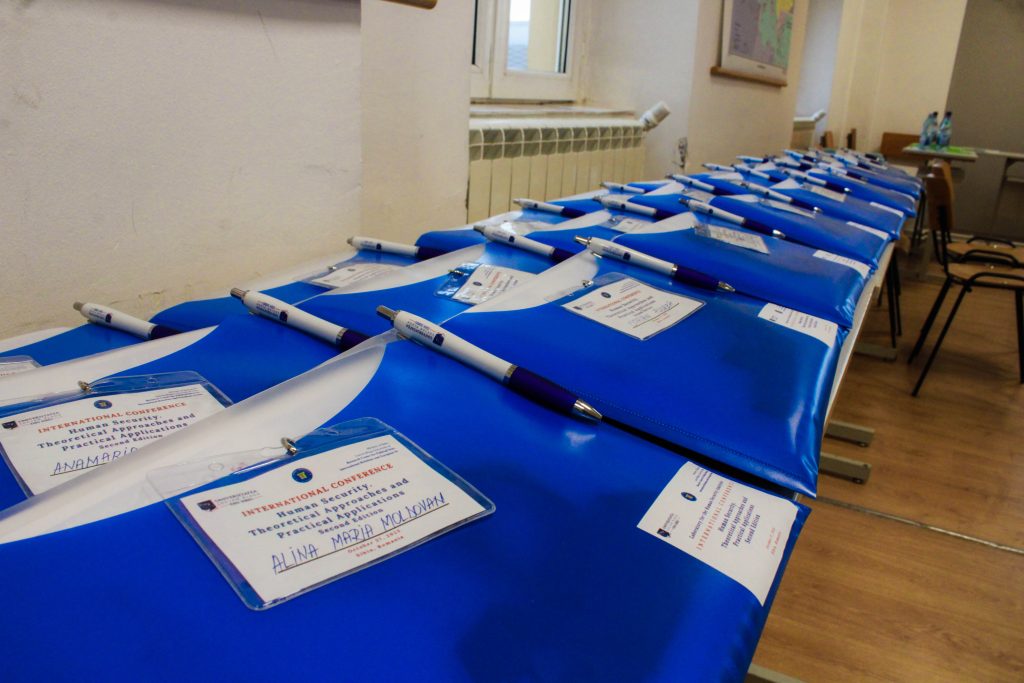
HSTAPA 2023 The conference proposed four panels: ”Civil Rights and Freedoms”; ”Immigrants and Refugees in Eastern Europe”, “Energy Security. Challenges within the Current Context of International Relations” and “Artificial Intelligence. Technology and Hybrid Warfare. Effects on Human Security”. The Conference Agenda lists 76 participants from 18 countries Romania, Albania, Austria, Belgium, Central African Republic, China, Cyprus, Germany, Ghana, Greece, Hungary, Morocco, Nigeria, North Macedonia, Poland, Serbia, the Republic of Moldova, the United States of America, representing 29 different universities, research centers and institutions: Adam Mickiewicz University of Poland; Alexandru Ioan Cuza Police Academy Bucharest, Romania; Association Centrafrique Action Verte Plus, Central African Republic; Babeș-Bolyai University of Cluj Napoca, Romania; Carol I National Defense University, Bucharest, Romania; Center for United Nations Constitutional Research, Brussels, Belgium; Chouaib Doukkali University of Morocco; Democritus University of Thrace, Greece; Fire Major, Fire Brigheid Headquarters, Athens, Greece; Institute of Legal Research of Romanian Academy; Jilin University, China; Qalam University, Katsina, Nigeria; Moldova State University; National University of Public Service, Budapest, Hungary; Nicolae Bălcescu Land Forces Academy of Sibiu, Romania; Nicolaus Copernicus University in Toruń; St. Cyril and Methodius University, North Macedonia; St. Kliment Ohridski University North Macedonia; Ștefan cel Mare Academy of Ministry of Internal Affairs of the Republic of Moldova; Takoradi Technical University, Ghana; University of Pitești, Romania; University of Florida, USA, Romania, University of Bucharest, Romania; University of Craiova, Romania; University of Crete-Rethymno, Greece; University of Graz, Austria; University of Nicosia, Cyprus; University of Oradea; University of Tirana, Albania. Keynote speakers: Ph.D. Professor Hubert Zimmermann, Philips University of Marburg, Germany, with the paper: “The Past and Future of Western Military Intervention”, based on the latest book ”Military Missions Justifications of Armed Foreign Assignments in the Past and in the Present”(2023). Professor Ph.D. Hubert Zimmermann is a well-known researcher in the field of international relations and security studies. He is the head of the International Relations Department of the Institute for Political Studies and coordinator for the Master Programs within the Department of Social Sciences and Philosophy at the Philips University of Marburg. Associate Professor, Ph.D. Daiana Maura Vesmaș, Lucian Blaga University of Sibiu, with the paper: “The Concept of Good Governance – a Premise for Freedom and Civil Rights within the European Union”. Associate Professor, Ph.D. Daiana Maura Vesmaș is a researcher, and expert on European Union law and administrative law, director of the Study Center, Scientifical Research and International Cooperation in Public Law and Administrative Sciences of the Law Faculty of Sibiu, member of the Romanian Academic Society of Administrative Science, member of five Scientific Committees of prestigious law journals
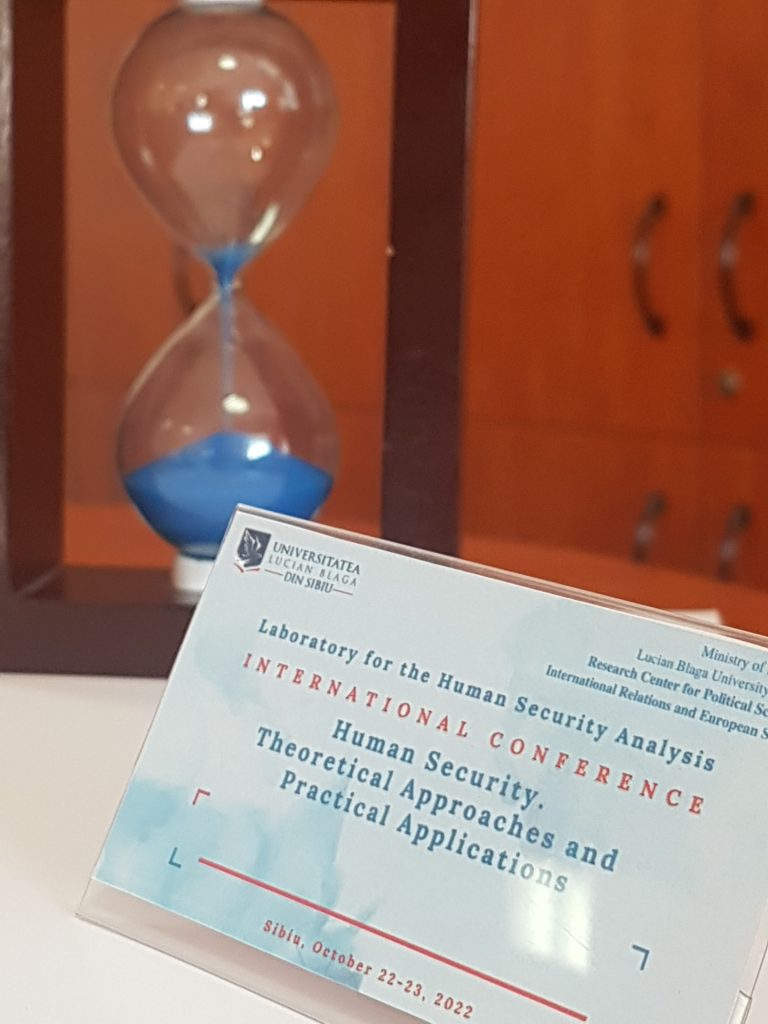
HSTAPA 2022 The conference proposed three panels: “Civil Rights and Freedoms”; “Human Security within the Transnistrian Issue”; “Immigrants and Refugees in Eastern Europe”, and a workshop entitled: “Recent minorities in Sibiu: Similar problems. Similar solutions”, in collaboration with the Arab, Ukrainian, Bessarabian, and Chinese communities, with the participation of the Immigration Office of Sibiu County. The Scientific Committee brings together renowned experts in the field of human security, from the Romanian Academy of Scientists, University of Strasbourg, University of Bordeaux, Florida Atlantic University, Sichuan University, Institute for Legal, Political and Sociological Research-Chisinău, Free International University of Moldova, Lucian Blaga University of Sibiu, Institute for Political Studies Belgrade. We had the privilege to have as a keynote speaker His Excellency Mr. Dan Sandovici, the Romanian Ambassador to the Syrian Arab Republic, PhD. of the Carol First National Defence University, with the presentation: “The Human Security in a War Zone. Brief Analysis of the Situation in Syria”. The Conference Program lists 64 participants from 11 countries: Romania, Egipt, Iraq, Italy, Nigeria, Poland, Serbia, Republic of Moldova, United States of America, Tunisia, and Ukraine, representing universities and research institutions: the Adam Mickiewicz University of Poland, Alexandru Ioan Cuza Police Academy of Bucharest, Babeș-Bolyai University of Cluj Napoca, Institute of Legal Research of Romanian Academy, Media Center of Tiraspol, Moldova State University, Nicolaus Copernicus University in Toruń, Osogbo Osun State Nigeria, Osun State University Nigeria, Politehnica University of Bucharest, Tiraspol School of Political Studies, Institute for Political Studies Belgrade, Ștefan cel Mare Academy of Ministry of Internal Affairs of the Republic of Moldova, University of Bucharest, University of Craiova, University of Oradea, Alexandru cel Bun Military Academy of Armed Forces of Chișinău. 45 paperworks were submitted for presentation and publication. The articles will be published in the “Studia Securitatis” Journal, and in the “Yearbook of the Laboratory for the Transnistrian Conflict Analysis”, both scientific publications of the Research Center for Political Sciences, International Relations and European Studies (indexed in ten, respectively four international databases).

Contact: Ph.D. Nicoleta Annemarie Munteanu
Phone: +40771589870
E-mail: nicoleta.munteanu@ulbsibiu.ro

